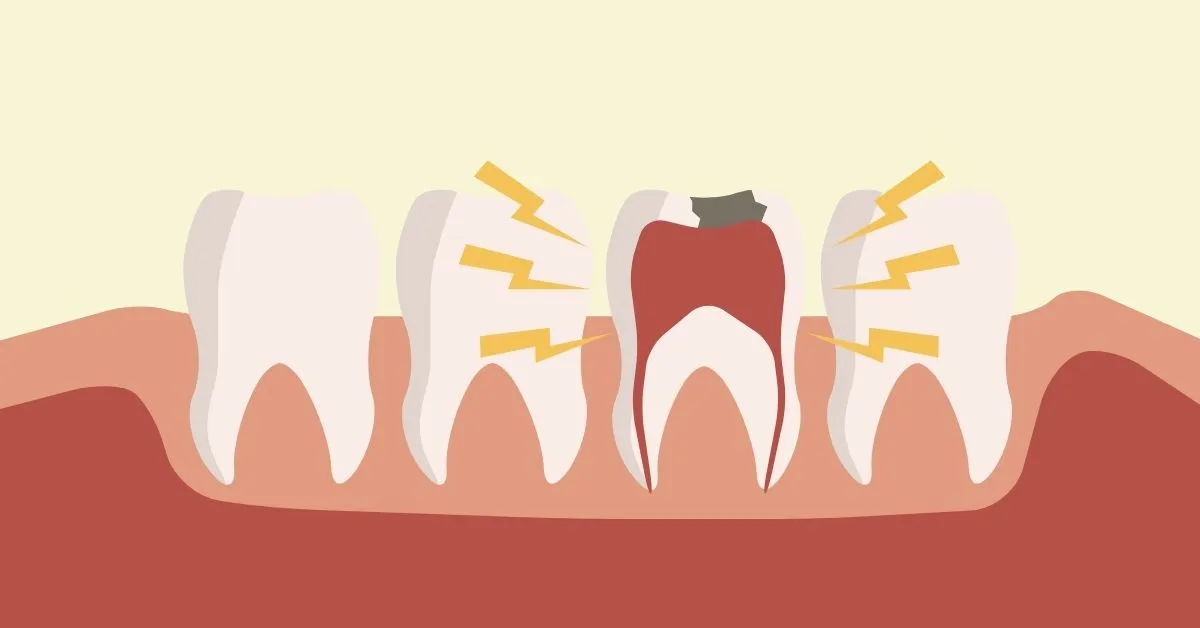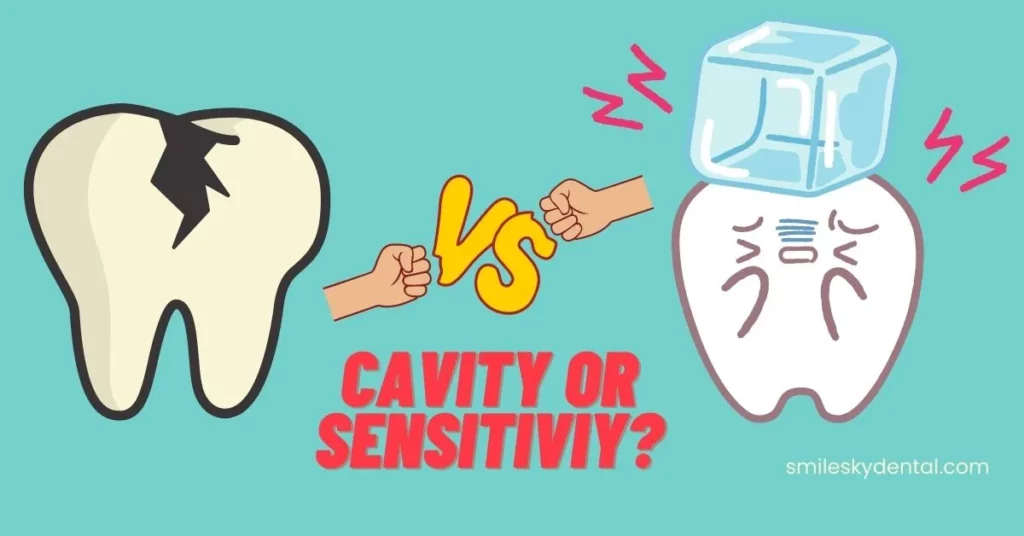Tooth pain can be a real pain, literally. What could it be, cavity or sensitivity? You’re going about your day, minding your own business and suddenly, you feel a jabbing pain in your tooth. The answer is not so simple.
Let’s understand the differences between the two so that you can manage your pain better. Understanding the problem is half the problem solved! Let’s begin…
Understanding Cavities and Sensitivity
The bacterium in your mouth produces acid that slowly erodes your tooth’s enamel. This leads to cavities. This erosion can also cause holes in your teeth along with a cavity. Cavities are not only painful they can also lead to tooth loss.
On the other hand, sensitivity is a more common problem affecting the masses. Enamel wear or receding gums makes dentin, the inner layer of your tooth, exposed which causes pain or discomfort. You usually experience you eat or drinking something either hot, cold, or sweet.
Symptoms of Cavities
Some of the symptoms of cavities are:
-
- Pain when you bite down or chew
-
- Sensitivity to hot or cold temperatures
-
- Visible holes or pits in your teeth
-
- Persisting toothache or pain that persists
Symptoms of Sensitivity
Sensitivity can present with different symptoms, including:
-
- Pain or discomfort when you eat or drink something hot, cold, or sweet
-
- Pain or discomfort wile brushing your teeth or floss
-
- Receding gums or enamel wear
Cavity Or Sensitivity: How to Tell the Difference
It can be a real challenge to realize you have a cavity or sensitivity, especially when you are in pain. However, there are a few key differences to keep in mind:
-
- Sensitivity will usually effect one tooth, while cavities can affect multiple teeth at once
-
- It is a sort-lived pain while cavity leads to a persistent throbbing pain
-
- Sensitivity is more often triggered by hot, cold, or sweet foods or drinks, whereas a cavity can cause pain when you bite down or chew.
What Causes Cavities?

The leading cause of cavities is the buildup of plaque. Plaque is a sticky film of bacteria that forms on your teeth. When you consume sugary or starchy foods and drinks, the bacteria in plaque produce acid that attacks your tooth enamel. This, in time, leads to cavities.
Cavity But No Pain: What You Need to Know
Although common, but you won’t always feel pain if you a cavity. Sometimes, a cavity can be painless. In this case, cavities can be difficult to track, which is one of the reasons why you should maintain proper dental hygiene. It is crucial that you know what you are looking for before you can understand measures to prevent them.
Preventing Cavities
Practicing good oral hygiene is the best way to prevent cavities. Brush twice a day at least and take two minutes each time. Floss regularly and make it a habit to use mouthwash. Other than this, try to keep the intake of sugary and starchy foods and drinks in check. It is best to visit a dentist regularly for cleanings and checkups.
Cavity Prevention for Those Who Can’t Go to the Dentist
If you’re unable to visit the dentist due to financial or other reasons, you can still practice cavity prevention. Try using fluoride toothpaste and mouthwash, and eat a healthy diet rich in fruits and vegetables.
Preventing Cavities Under Fillings
A filling is used to protect your teeth from further decay, but cavities can form under these fillings which can turn painful quickly. Preventing cavities under fillings is not hard but it requires consistency.
It’s essential to take care of them to prevent cavities from forming underneath them. Maintaining your dental hygiene and avoiding food that can damage your filling is the best practice to avoid cavities.
Large Tooth Cavity: What You Need to Know
If you are suffering from a large cavity, seeking treatment as soon as possible is important. Large cavities can lead to infections and even tooth loss if left untreated.
Sensitive Teeth vs. Cavities: What’s the Difference?
Although sensitive teeth and cavities are both uncomfortable and painful, but they have different causes. Sensitivity is usually caused by an exposed dentin, while cavities are caused by tooth decay.
Sealant for Sensitive Teeth: Does It Work?
Sealants can be an effective way to protect sensitive teeth from further damage. They create a barrier between your tooth enamel and the foods and drinks that can cause sensitivity.
Tips for Sensitive Teeth
To prevent tooth sensitivity, it’s essential to practice good oral hygiene by brushing your teeth twice a day for two minutes each time and flossing daily. Try to use a soft-bristled toothbrush and brush gently to prevent damage to your tooth enamel.
Additionally, using toothpaste specifically designed for sensitive teeth can help reduce sensitivity. They work by blocking the tubules in your teeth that lead to the nerves. Since they are a leading cause of tooth decay and sensitivity. you should also avoid acidic foods and drinks and limit your consumption of sugary and starchy foods.
FAQs
Can Cavities Be Painless?
Yes, in the early stages, cavities can be painless. This is why you should get regular checkups and cleanings so that you can catch cavities before they become serious.
What Happens If You Don’t Take Care of a Cavity?
If you don’t take care of a cavity, it can lead to more serious health problems like tooth loss and infections. You should seek treatment as early as possible to avoid any risk.
What Happens If a Cavity Is Left Untreated?
If a cavity is left untreated, it leads to further decay and damage to the tooth. In some cases, the infection spreads to other teeth, or seeps into the jawbone, which leads to more serious dental problems.
Still confused if you have a cavity or sensitivity or are you looking for a solution to your tooth problem? Get in touch today with us because we, at Smile Sky Family Dental, take extra care in making sure that your smile is pain-free. We also offer personalized treatment plans to meet the unique needs of each of our patients. Whether you’re looking for preventive care or have existing dental problems, you can trust Smile Sky Family Dental to provide you with the highest quality dental care.


